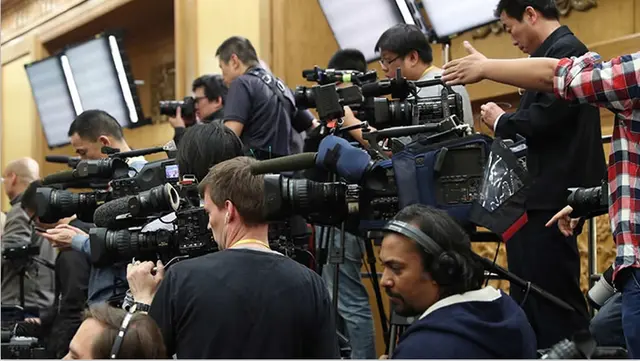U.S. President Barack Obama on Tuesday urged Congress to delay massive government spending cuts in the near term to boost economic growth despite the spiking government debt, adding twists to the government's debt reduction efforts.
U.S. President Barack Obama briefs press at the White House in Washington D.C. on Feb. 5, 2013. Obama on Tuesday urged Congress to delay massive government spending cuts in the near term, saying government budget policies will have effects on U.S. economic growth.(Xinhua/Fang Zhe)
Soften spending cuts
Government budget decisions have "real and lasting" impacts on the strength of U.S. economic recovery, while drastic government spending cuts will cost jobs to be created and slow down the economic growth pace, Obama said at a White House press conference on Tuesday.
Obama asked Congress to postpone the government outlays cuts starting on March 1 and stressed the importance of a balanced government fiscal policy to bolster economic recovery.
Roughly 85 billion U.S. dollars of spending cuts were set to hit various U.S. governmental departments this year starting on March 1, as agreed by Democrats and Republicans in January to resolve the so-called "fiscal cliff."
"This doesn't have to happen," Obama told reporters, referring to the across-the-board cuts poised to kick in next month.
U.S. Congress is working on the government's budget for 2014 fiscal year starting on Oct. 1 this year, which might not be achieved by March 1. Obama urged lawmakers to pass a modest bill to soften the impact of the government spending reductions for several months to allow more time to produce a broader package to tackle mounting government deficit.
Budget wrangling since 2011
The across-the-board automatic government spending cuts, the so- called "sequester" or "sequestration" in U.S. government budget language, were included in the August 2011 debt-ceiling package to force lawmakers to come up with a long-term deficit reduction plan.
The package also created a 12-member debt reduction super- committee of top lawmakers who were tasked to come up with a plan to replace the sequestration. The committee failed in November 2011, and a total of more than 1 trillion dollars cuts over the next decade were set to begin in January, or about 109 billion dollars per year.
A "fiscal cliff" deal shifted about 24 billion dollars of the first two months of spending cuts into future government appropriations bills, but the last-minute deal still left 85 billion dollars in government outlays cuts to begin in March.
U.S. real gross domestic product (GDP) unexpectedly declined 0. 1 percent in the fourth quarter of 2012 due to shrinking government defense spending, the first time that the world's largest economy shrank since the second quarter of 2009, showed a U.S. Commerce Department report last week.
However, the unexpected quarterly economic dip provided a political olive branch to officials at the White House who advocated more fiscal stimulus steps to bolster the anemic economic recovery. "We can't just cut our way to prosperity," Obama stressed.
Continuing fiscal flght
The proposals he has offered to U.S. House Speaker John Boehner last year during the widely-scrutinized "fiscal cliff" discussions are still on the table, Obama noted.
The trillion-dollar debt reduction plan mulled over by Obama and Boehner last year went nowhere, partly due to the intransigence of Democrats to slash entitlement spending requested by Republicans, which is also the main driver of U.S. ballooning government deficit.
Obama stressed the nation is making progress on achieving 4 trillion dollars government deficit reduction over the next decade, but part of the deficit reduction should come from tax reforms. Resolving the nation's fiscal challenge through additional tax revenue has remained a flashpoint between Democrats and Republicans.
Top Republican lawmakers including Boehner were resisting a new round of tax hike to solve the government's deficit problem, as Republicans have just agreed an income tax rate hike for households making more than 450,000 dollars a year to resolve the "fiscal cliff" challenge, the first time in two decades that GOP lawmakers gave the green light to an income tax increase.
Experts held that wars in Afghanistan and Iraq, Bush-era tax cuts, economic stimulus measures under the Obama administration to tide over the severe economic recession and surging medical expenses on back of an aging society all contributed in a major way to the spiking U.S. national debt.
In its latest budget outlook, U.S. Congressional Budget Office on Tuesday predicted the federal government to register an 845- billion-dollar budget deficit this year, the first time during Obama's presidency that the red ink would fall below the 1- trillion-dollar threshold, but was still at an alarmingly high level.
 简体中文
简体中文



